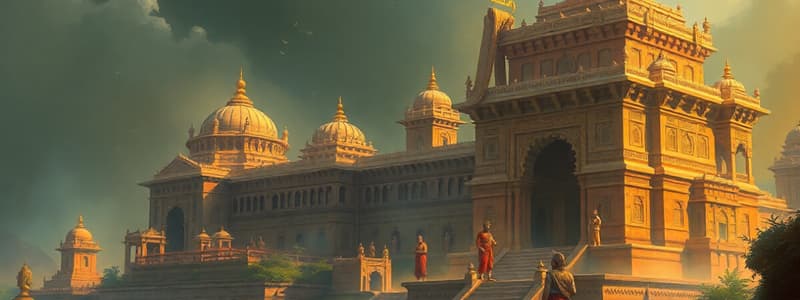Podcast
Questions and Answers
What is the significance of the Mauryan Empire in ancient Indian history?
What is the significance of the Mauryan Empire in ancient Indian history?
- It was known for its military conquests and territorial expansion.
- It was a period dominated by trade with European powers.
- It emphasized extensive administration and non-violence under Ashoka. (correct)
- It marked the end of the Indus Valley Civilization.
Which of the following civilizations is known for advanced urban planning and drainage systems?
Which of the following civilizations is known for advanced urban planning and drainage systems?
- The Delhi Sultanate
- The Indus Valley Civilization (correct)
- The Gupta Empire
- The Vedic Period
What characterized the blending of cultures during the Delhi Sultanate?
What characterized the blending of cultures during the Delhi Sultanate?
- The dominance of Hindu practices in Islamic rule.
- The creation of purely Islamic architecture without influence.
- The complete removal of pre-Islamic traditions.
- A mix of Islamic and Indian cultures reflected in various aspects. (correct)
What was a critical outcome of the Sepoy Mutiny of 1857?
What was a critical outcome of the Sepoy Mutiny of 1857?
Which empire is recognized as a 'golden age' of India due to advancements in various fields?
Which empire is recognized as a 'golden age' of India due to advancements in various fields?
Which event marked the beginnings of European influence in India?
Which event marked the beginnings of European influence in India?
Which Indian leader is associated with advocating non-violent resistance during the independence movement?
Which Indian leader is associated with advocating non-violent resistance during the independence movement?
During which period did the Vijayanagara Empire flourish?
During which period did the Vijayanagara Empire flourish?
Flashcards
What was a key characteristic of Indus Valley Civilization?
What was a key characteristic of Indus Valley Civilization?
The Indus Valley Civilization was one of the earliest urban civilizations in the world, known for its advanced city planning, drainage systems, and standardized weights and measures.
What defined the Vedic period?
What defined the Vedic period?
The Vedic Period saw the development of the Vedic culture, characterized by the composition of the Vedas, sacred texts that formed the basis of Hinduism.
What made the Mauryan Empire under Ashoka significant?
What made the Mauryan Empire under Ashoka significant?
The Mauryan Empire under Ashoka was known for its extensive administration and emphasis on Dharma and non-violence.
Why is the Gupta Empire often called a golden age?
Why is the Gupta Empire often called a golden age?
Signup and view all the flashcards
What was a key outcome of the Delhi Sultanate?
What was a key outcome of the Delhi Sultanate?
Signup and view all the flashcards
What were the key characteristics of the Vijayanagara Empire?
What were the key characteristics of the Vijayanagara Empire?
Signup and view all the flashcards
How did the British East India Company influence Indian history?
How did the British East India Company influence Indian history?
Signup and view all the flashcards
What impact did the Sepoy Mutiny have on British rule in India?
What impact did the Sepoy Mutiny have on British rule in India?
Signup and view all the flashcards
Study Notes
Ancient Indian History
- The Indus Valley Civilization (c. 3300-1300 BCE) was one of the earliest urban civilizations, known for advanced city planning, drainage systems, and standardized weights and measures.
- The Vedic Period (c. 1500-500 BCE) saw the development of Vedic culture, characterized by the Vedas, sacred texts forming the basis of Hinduism.
- The Mauryan Empire (c. 322-185 BCE), under Ashoka, demonstrated extensive administration and emphasized Dharma and non-violence.
- The Gupta Empire (c. 320-550 CE) is considered India's golden age, showcasing advancements in art, science, mathematics, and literature.
- Interactions with foreign powers (Greeks, Scythians, Kushanas) led to significant cultural exchanges.
- Jainism and Buddhism emerged, significantly influencing religious and intellectual life.
Medieval Indian History
- The Delhi Sultanate (1206-1526) saw various dynasties (Slave, Khalji, Tughlaq).
- This period showed a blend of Islamic and Indian cultures, noticeable in architecture, language, and social practices.
- The Vijayanagara Empire (1336-1646) in South India was powerful and prosperous, characterized by cultural synthesis and advancements in architecture and administration.
- European powers started interacting with India through trade and expansionist endeavors.
Modern Indian History
- The British East India Company established presence in the 17th century, expanding control over the Indian subcontinent.
- The Sepoy Mutiny (1857) led to British Crown direct rule.
- The Indian independence movement emerged in the late 19th and early 20th centuries, with Mahatma Gandhi spearheading non-violent resistance.
- India gained independence on August 15, 1947, following various movements and protests.
- The partition of India and Pakistan caused massive displacement and violence.
- Post-independence India faced challenges of establishing a democracy, including economic development, social inequalities, and regional integration.
- The Indian economy grew, increasing its global influence.
- Developing political institutions shaped India's future.
Studying That Suits You
Use AI to generate personalized quizzes and flashcards to suit your learning preferences.




